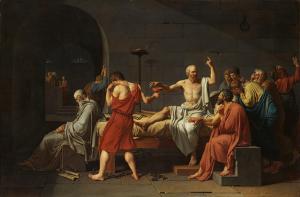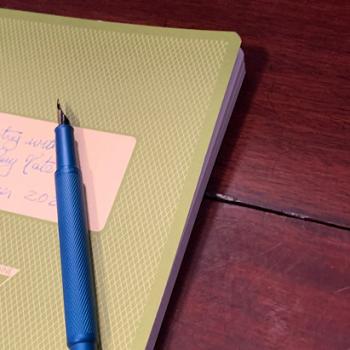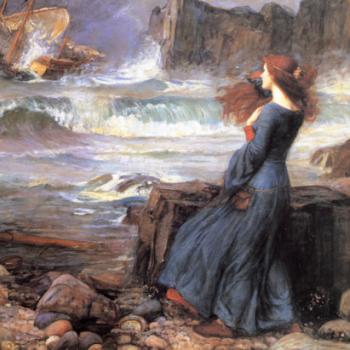
Before the pandemic, Jeff Williams sent me a criticism of my views of Shakespeare. I took a break from “back and forth” contention for a period of time, but now seems a good moment to let Mr. Williams have his say. My views on the poet and playwright are summarized here.
Why doesn’t Williams persuade me? Check any of his claims. They all depend on a series of assertions many of them dubious or wrong. When he cannot even get my views right, and you can look and see, we have good reasons to doubt his reading of the much more difficult and profound Bard!
Mr. Williams misunderstands Dante, missing the splendor and beauty of the poet, his theology of Divine Love, and the very limited role the demonic has in the whole of the Comedy. (Oddly, his Bloom quote puts Dante in a better context.) Williams certainly has missed most modern scholarship on the nature of the Middle Ages and the connection of that period to the Renaissance, which sees less a “break” between the two periods and more continuity. His views about what he calls the “long darkness” of the earlier period are simply bad history now refuted by better secular scholarship. The idea that Medieval thinkers were disconnected from the ideas of the classical or other pagan worlds is refuted by a reading of Boethius (best seller in the Middle Ages), Beowulf, and a look at Mediaeval cathedral decorations. The classical and other pagan ideas were examined, criticized, adopted, and debated.
Out of Williams own errors he has proposed a novel reading of a Shakespeare play that not surprisingly confirms his own ideas.
He doesn’t even get my views right:
- I don’t think Shakespeare a Catholic.
- I think Christianity was central to the period as demonstrated from Shakespeare’s life, but certainly not the only influence. Atheism was, as always, abroad.
- I don’t think Shakespeare or the Renaissance merely an extension of previous periods
- My view of the play Midsummer is that the sequence of lunatic, lover, and poet show the limits and dangers of imagination. All three types make mistakes in the play due to not limiting imagination. The poet has a chance of doing this. This reading has the advantage of being in the text and not extra to it. Note that Williams cuts the speech he quotes short. Here is the end:
“Such tricks hath strong imagination
That, if it would but apprehend some joy,
It comprehends some bringer of that joy.
Or in the night, imagining some fear,
How easy is a bush supposed a bear!”This ending matters! We see the lunatic/madman, lover, and poet are subject to tricks that give false joys and fears. The speaker is pushing for reality! This lovely comedy is not (secretly!) about some overarching view of history, but a taming of the wonderful (but dangerous!) Midsummer dreams, but I will let our readers take a look and decide that for themselves how much else he gets wrong.
A decent test may be his reading of the Shakespeare play. If you read the passage in context that Williams’ quotes from Midsummer, and think that Shakespeare is really doing what Williams asserts (and Williams even missed the unity of the lunatic/madman in his earlier piece), then nothing else I say will likely persuade you. I shall simply point you to any standard commentary on the text of the play. Like many clever people, Williams finds what he means to find and rereads a passage to find it. The problem is, to paraphrase a professor I knew when faced with an exegesis : “Why would anyone have thought this in the first place?”
He is certainly correct that some Shakespeare scholars have questioned Shakespeare’s commitment to Christianity. Bloom is excellent, if eccentric. Here is another perspective on Bloom that does think Shakespeare a Catholic!
In fairness, I will give Williams the last word:
Williams’ Response
As he so often does, Dr. Reynolds has presented an emotional reaction to an argument I never presented. I could easily dismiss his response as mere strawmen and sweeping generalizations, but I think it would be instructive for us to trace his false claims about the Renaissance, the Shakespearean texts, and twisting of what I actually wrote.
I think it would be best to first restate my thesis. The Renaissance introduced humanism and secularity after the long darkness of Medieval scholasticism and the authority of the Catholic Church.
One key theme of Humanism was to reconnect Europe to its pre-Christian classical and pagan past. This is a prevalent theme in Shakespeare, whose plays have elements of Christianity, Classical pre-Christian Greece and Rome, and Northern European pre-Christian paganism. Although nobody really knows if Shakespeare was a believer in Christianity or not (it is commonly said of him he was certainly Catholic… or Pagan, or an atheist), all three elements appear in his works. I explicitly stated I was not addressing the question of his religious belief but offering him as an example of what I call the first symptoms of Europe rejecting the graft of Christianity. In concert with the theme of the Renaissance, Shakespeare used these elements to reconnect his contemporary Europe to this pre-Christian past in order to regain what had had been lost to the culture during the time of church rule. It is possible that, like Marlowe, Shakespeare did lean toward an anti-Christian sentiment but was more careful about not overstepping boundaries, and it is equally possible he tried to moderate Christianity to accord more with prior European culture. Either way, it was a beginning of the rejection of total authority of the church and reintroduction of classical and pagan Europe – a rejection that accelerated over the next five centuries. This is a bit more nuanced than Reynold’s strawman distortion of Shakespeare as radical anti-theist.
Renaissance Ideals
Dr. Reynolds presents a false and fatally restrictive description of the Renaissance. He characterizes Renaissance England thus:
“We need not explain away anything about his plays if we merely accept Shakespeare as the consistent product of his time and his education, which produced his preference for classical, Christian culture.”
In so doing, he conceals the essential aspects of Shakespeare’s time and culture in an attempt to make it appear a mere extension of Medieval Scholasticism and Church. At great peril of appearing to snobbishly appeal to authority (with my apology to those of a more delicate nature to whom this habit of mine seems to cause psychic offense), I will contrast Reynolds’ assertion to a more conventional and scholarly understanding of the English Renaissance. The British critic, author, and Shakespeare scholar, Andrew Dickenson, writes in an article for The British Library:
“Though historians debate the precise origins of the Renaissance, most agree that it – or one version of it – began in Italy some time in the late 1300s, with the decline in influence of Roman Catholic Christian doctrine and the reawakening of interest in Greek and Latin texts by philosophers such as Aristotle, Cicero and Seneca, historians including Plutarch and poets such as Ovid and Virgil.”
“Gradually, the concept of a ‘humanistic’ curriculum began to solidify: focussing not on Christian theological texts, which had been pored over in medieval seats of learning, but on classical ‘humanities’ subjects such as philosophy, history, drama and poetry. “
Contrary to Reynold’s unfounded claim, the Renaissance was not a simple continuation of Medieval Christianity, but a return to secular humanism and reattachment to European pre-Christian culture. As the early first step in this rejection of the graft, it was not a dismissal of Christianity but rather the important act of removing Christianity as the central focus and once again contemplating European origins and man as the measure of things.
Education
Dickenson then describes education at the time of Shakespeare, which contrasts starkly with Reynold’s unhistoric claim that Shakespeare was reflecting his classical Christian education:
“In Britain, humanism was spread by a rapid increase in the number of ‘grammar’ schools (as their name indicates, language was their primary focus, and students were often required to speak in Latin during school hours), and the jump in the number of children exposed to the best classical learning. Shakespeare, Marlowe, Spenser, Jonson, Bacon: almost every major British Renaissance intellectual one can name received a humanist education. Shakespeare’s plays and poems are steeped in writers he encountered at school – the magical transformations of Ovid’s poetry infiltrate the worlds of A Midsummer Night’s Dream and The Tempest, his Roman histories are cribbed from the Greek historian Plutarch, The Comedy of Errors is modelled closely on a Greek drama by Plautus, while Hamlet includes an entire section – the Player’s account of the death of Priam – borrowed from Virgil’s Aeneid.”
Reynolds then employed a typical apologist rhetorical trick of projecting his deficiency of stance onto his opponent when he accused me of allowing my bias to distort the culture and education of Shakespeare when in fact that is exactly what he did with his unfounded sweeping claim of the centrality of Christianity. My approach is to allow the facts their primacy of place. As we will see later, this rhetorical trick is further applied to the text of Shakespeare’s plays themselves.
The Question of Shakespeare and Religion
Reynolds gave us another unfounded sweeping claim that Shakespeare was undoubtedly a Catholic in response to what I presented as the conventional view among scholars that we cannot really know his true beliefs as in the texts we see prominent examples of Paganism, Catholicism and nihilistic atheism. The preeminent scholar of English Literature with special expertise in Shakespeare, the Renaissance, and Medieval England, Harold Bloom, better explains the nuance and complications of this question in Shakespeare: The Invention of the Human:
“We cannot know, by reading Shakespeare and seeing him played, whether he had any extrapoetic beliefs or disbeliefs. G. K. Chesterton, a wonderful literary critic, insisted that Shakespeare was a Catholic dramatist, and that Hamlet was more orthodox than skeptical. Both assertions seem to me quite unlikely, yet I do not know, and Chesterton did not know either. Christopher Marlowe had his ambiguities and Ben Jonson his ambivalences, but sometimes we can hazard surmises as to their personal stances. By reading Shakespeare, I can gather that he did not like lawyers, preferred drinking to eating, and evidently lusted after both genders. But I certainly do not have a clue as to whether he favored Protestantism or Catholicism or neither, and I do not know whether he believed or disbelieved in God or in resurrection. His politics, like his religion, evades me, but I think he was too wary to have any.
“Though G. K. Chesterton liked to think that Shakespeare was a Catholic, at least in spirit, Chesterton was too good a critic to locate Shakespeare’s universalism in Christianity. We might learn from that not to shape Shakespeare by our own cultural politics. Comparing Shakespeare with Dante, Chesterton emphasized Dante’s spaciousness in dealing with Christian love and Christian liberty, whereas Shakespeare “was a pagan; in so far that he is at his greatest in describing great spirits in chains.” Those “chains” manifestly are not political. They return us to universalism, to Hamlet above all, greatest of all spirits, thinking his way to the truth, of which he perishes. The ultimate use of Shakespeare is to let him teach you to think too well, to whatever truth you can sustain without perishing…
“Do Shakespeare’s modes of representation in themselves betray any ideological turn, whether Christian, skeptical, hermetic, or whatever? The question, difficult to frame, remains urgent in its implications: Is Shakespeare, in his plays, ultimately a celebrant of life, beyond tragedy, or is he pragmatically nihilistic? Since I myself am a heretical transcendentalist, gnostic in orientation, I would be happiest with a Shakespeare who seemed to hold on to at least a secular transcendence, a vision of the sublime. That seems not altogether true; the authentic Shakespearean litany chants variations upon the word “nothing,” and the uncanniness of nihilism haunts almost every play, even the great, relatively unmixed comedies.”
What commands the attention in the above passages is the contrast of Shakespeare’s textual Paganism to the spacious Christianity of Dante’s texts, as acknowledged by the Catholic Chesterton, and the indeterminacy of Shakespeare’s religious beliefs, if any at all.
Interpretation: The Play is The Thing
As mentioned above, Reynold’s repeats his rhetorical trick of painting his opponent with the color of his own deficiency, here in regard to the texts themselves. Ironically, he retorts the play is the thing, while he himself bases his own claims and remarks almost entirely on external examples with almost no basis in the text. What I attempted to do was just the opposite: interpret from Shakespeare’s own words, or in Bloom’s locution, hew to the “authentic Shakespearean litany”.
At the expense of even further expansion of this writing, I need to present the opening quote of my last essay which well encapsulates my thesis. It appears at the beginning of
Act V of A Midsummer Night’s Dream:
The lunatic, the lover, and the poet
Are of imagination all compact.
One sees more devils than vast hell can hold:
That is the madman. The lover, all as frantic,
Sees Helen’s beauty in a brow of Egypt.
The poet’s eye, in a fine frenzy rolling,
Doth glance from heaven to Earth, from Earth to
heaven,
And as imagination bodies forth
The forms of things unknown, the poet’s pen
Turns them to shapes and gives to airy nothing
A local habitation and a name.
I further demonstrated from examples of the text of the play itself that what is at work here are:
1. A departure from the madness of devils and hell characteristic of the theocracy of the Medieval Church.
2. A Renaissance refocusing on the earthly powers that buffet and excite man in this world, reaching back to classical Greece and northern Paganism through the wandering in the dark of moonstruck lovers.
3. And most importantly of all, the urgent role of the authentic poet to hear the music of these earthly powers and play this music in the authentic poetry of originating language: to give heretofore unknown things form, place and name.
Reynolds merely rejected this out of hand, with absolutely no support from the text, nor any substantive rebuttal of the textual examples I provided. More importantly, he offered no counter interpretation. In another forum (Twitter) I successfully pressured him to finally provide an interpretation which I found stunningly absurd. His claim, briefly stated, was that this was all about the role of Christian rationalism; the madness of devils and the madness of the lovers were the same and driven by non-Christian sensuality; and the role of the poet was to reconcile these with reason and moderation inspired by his Christianity.
The problem, of course, is all of this directly contradicts the “thing” of the play. It is important to note that it was Oberon and Puck who brought about the final reconciliation as Pagan Fairy King and Fairy – the very opposite of a Christian God. All inspiration of the characters of the night came directly from paganism, while only the day characters of Theseus and Egeus characterize rationality and come off the worse for it.
Reynold’s restrictive and contrived interpretation conceals the true importance of the play, the essence of which is the poetic creation of our world from the earthly music and dreams of man. This accords well with Bloom’s thesis that Shakespeare accomplished the greatest act of poetry in history through his creation of man as individual rather than type. Through the music he heard and his inspired dreams, the heretofore unknown thing to which Shakespeare gave form, place and name was nothing less than the soul or nature of man himself and the mystery of his place in the cosmos.
Not an answer to that mystery, but the awesome revelation of the mystery itself. And with the realization of the immensity of the mystery and depth of our nature, the primitive answers of a strange Eastern religion begin to lose their power to explain.












